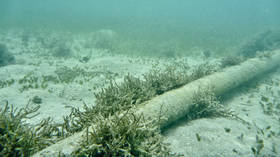Meta to install controversial sea-floor cable

Deep-sea cable installers are about to begin laying a transatlantic cable line for Meta, the social media behemoth formerly known as Facebook, through Nova Scotian fishing grounds as soon as this week, according to Canadian media. Local fishing and conservation groups said on Monday the project was pushed through without enough – or any – input from the community.
The Atlantic Groundfish Council, a regional fishing trade group, told CBC News on Monday “the consultation here was largely non-existent,” pointing out that they had suggested an alternate route that didn’t disturb important fishing grounds but received no response. Talks with consultants for the project lasted just one month, according to Kris Vascotto, a spokesman for the group.
The organization had “anticipated that there would be further discussions” with either the government Department of Fisheries and Oceans or at least with the company then known as Facebook itself, but they heard nothing until they were told last week that “a vessel was going to be coming into the area and that gear should be removed from the area to facilitate the laying of the cable.”
The process is expected to take at least a month and a half, as fishermen are being told to stay at least one nautical mile away from cable-laying vessels through the end of March and to remove any gear within half a nautical mile of the route to be traveled by the cable-laying vessel.
It’s not clear who besides Meta will have access to the 3.8cm-wide (1.5-inches) fiber optic cable, or what they will have to pay the multi-billion-dollar company for the privilege of using it – official papers merely state that “the Amitié fiber optic cable will carry internet, telephone and data between the United States and Europe.” Described by engineering professor Jean-Francois Dalhousie as providing “a significant advance in the movement of data,” the cable will be partially owned by Microsoft and Vodafone in addition to Meta’s 80% share. While the cable will be buried in parts, it will remain exposed in other areas, which has fishing groups on edge lest they be held liable for damages in places where the sea floor is too rocky to bury the line. There are concerns the fishing industry may lose access to the area entirely.
While local fishing groups had scant input on the project, the Canadian government reportedly approved it in December, complete with a “letter of advice” from the Department of Fisheries and Oceans regarding how to avoid or minimize harming fish habitats. However, the agency declined to release the letter to CBC News or explain what guidelines (if any) it expects Alcatel Submarine Networks, the company that will actually be doing the cable-laying, to adhere to.
Alcatel itself was slightly more forthcoming, with spokesperson Rachel Van Oppen declaring that both the cable route and means of installation were “adjusted to minimize both environmental and fisheries impact.” The cable will be buried in the Funding Channel-Browns Bank Area of Interest using “low-impact technology” to avoid “interaction with fishing gear,” Van Oppen told CBC.
However, the fishing trade group’s spokesman argued the Department of Fisheries and Oceans had claimed otherwise, suggesting the cable would be laid on top of the seabed in order to protect the coral beneath. The agency declined to reveal either way what directions it had given Alcatel, merely stating that after discussions with the agency, the company had “revised” their initial route to “protect deep water corals and sponges.” The department also suggested it was Alcatel’s responsibility, not their own, to negotiate with the fishing industry.













